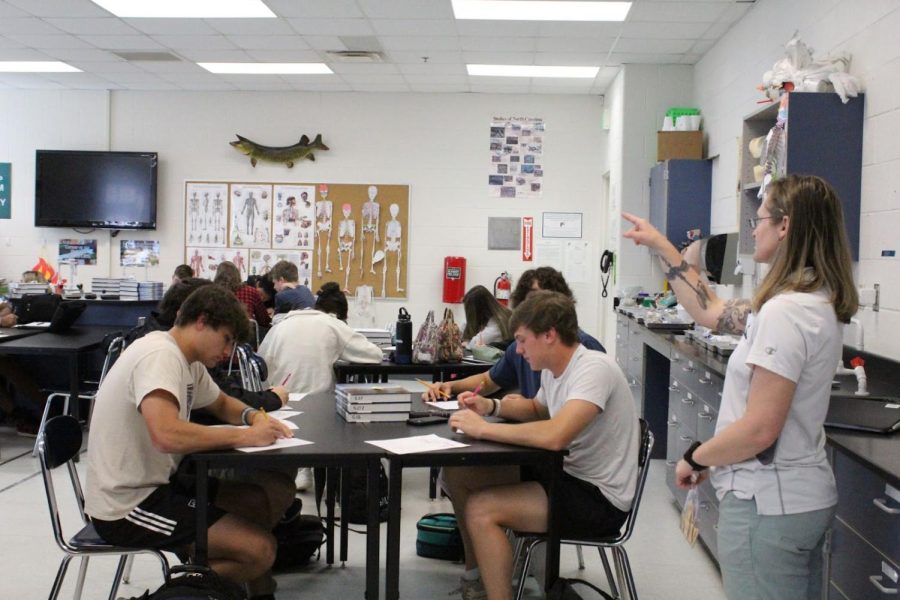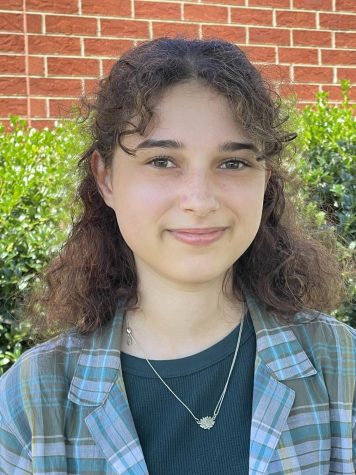AP classes gear up for final exams
AP Environmental Science teacher Stephanie Pearson guides students through practice with free response questions. Her formal AP exam preparation for students began after spring break.
April 28, 2022
The first weeks of May are steadily approaching, and with their onset also comes the arrival of Advanced Placement final exams. AP students and teachers alike are getting themselves ready to make sure these tests are confidently aced.
When it comes to AP classes, preparation for exams begins almost as soon as the class does. Classroom tests are often designed similarly to what one would find on a final AP exam, and techniques for passing them are incorporated into daily teaching. The promise of these tests lingers as an inevitable adversary to wrap up the class, so the sooner students can start honing their skills the better.
“We first started preparing for the AP exam really at the beginning of the year by working on essays,” freshman William Starling said, an AP World History student.
Successfully passing AP exams can result in college credit for high school students, allowing them to potentially avoid taking a similar introductory course in college. All exams are scored on a scale of one to five, with five being the highest. Colleges generally accept scores of three to five.
AP exams are conducted by the College Board. Almost all AP students are expected to be able to access the College Board website, which allows teachers to administer practice tests, helpful videos, and other resources to help students.
“We’re going to offer additional study sessions before and after school, and we are offering a mock exam on April 23,” AP Environmental Science teacher Shannon Pylant said. “We will do self-evaluation of what units everyone needs to focus on and promote the College Board videos as well.”
AP teachers are also working diligently with their students to provide adequate preparation for the exams as they near. Several teachers have offered mock exams for students to take, allowing them to experience taking a real AP test and assess strengths and weaknesses. Teachers are also holding review sessions to help students perfect the content.
AP United States History teacher Kristen Crews held study sessions for students during mid-April and is continuing them until April 28. Availability before and after school is being accommodated with each review day focusing on certain periods of American history.
Students are also at work to get ready for their final tests, utilizing any practices their teachers offer as well as studying notes and using review strategies.
“I usually look over my notes and study each and every topic by just understanding it,” senior Halak Chauhan said, who is enrolled in AP Environmental Science and AP Calculus. “Then I do all provided study guides. I also like to make a review sheet with all the important terms and information I need.”
For students considering taking an AP class, it’s important to bear in mind the effort and focus required. The intention of an AP class is not to excessively stress students, but they should be aware that these classes are deemed “advanced placement” for a reason.
“AP classes have a lot more of a challenge because of the more heavy and difficult workload, plus more challenging content,” Starling said. “They also have the feeling of a higher-stakes, bigger test at the end of the course that puts more pressure on the class.”
Although it may be a major goal of AP students to achieve a quality score on their finals, doing well on the tests is not the only objective these classes have. The biggest takeaway shouldn’t be whether they get a one or a five, but how they have learned and grown as a person and student. This assurance is reflected in Pylant’s advice for AP students.
“Take a deep breath. Relax, and trust yourself because you’ve worked so hard all year,” Pylant said. “It’s one day, one snapshot of your whole AP experience. It’s more important to love the content, to love the class and to love what you’ve been doing.”


